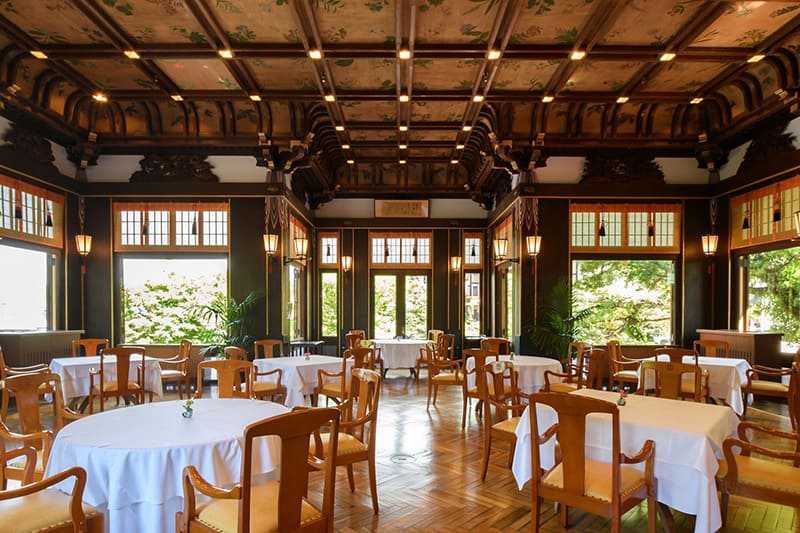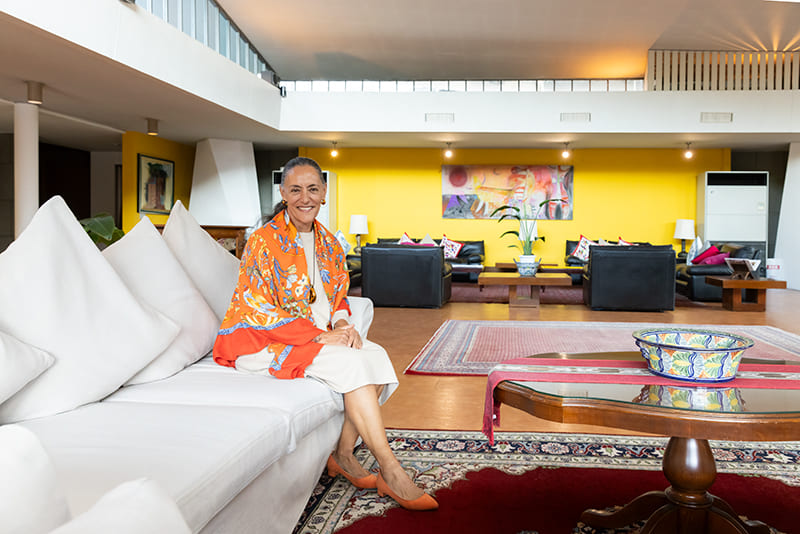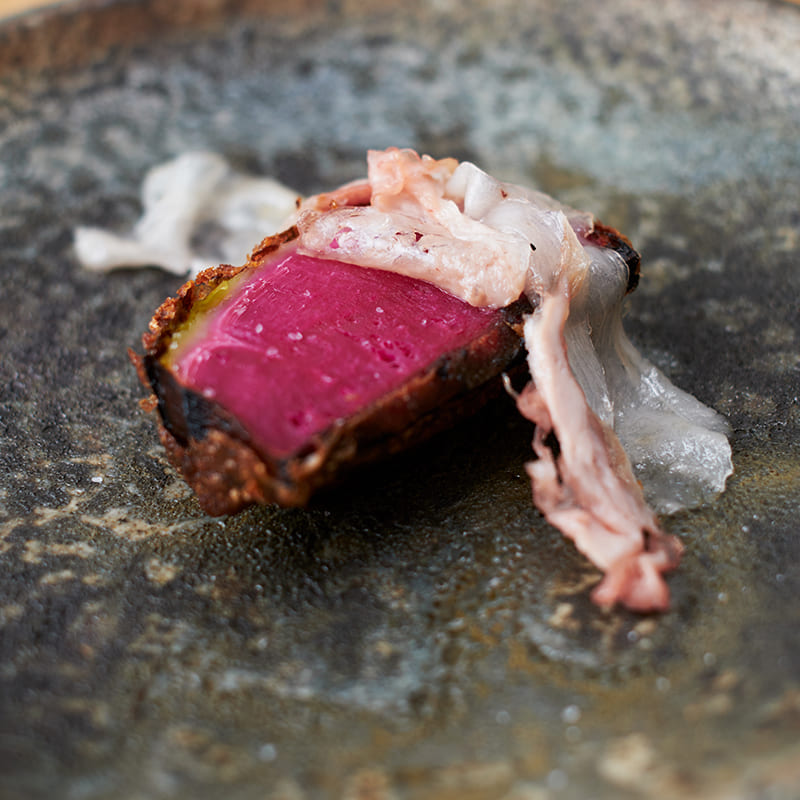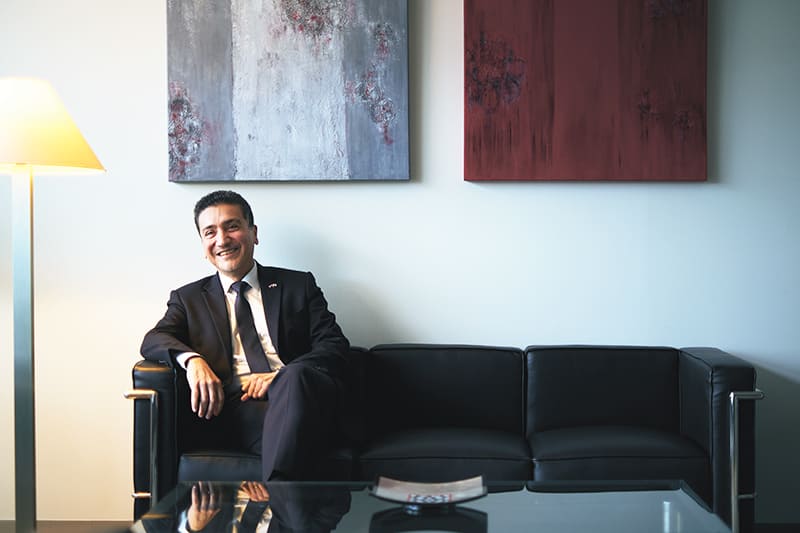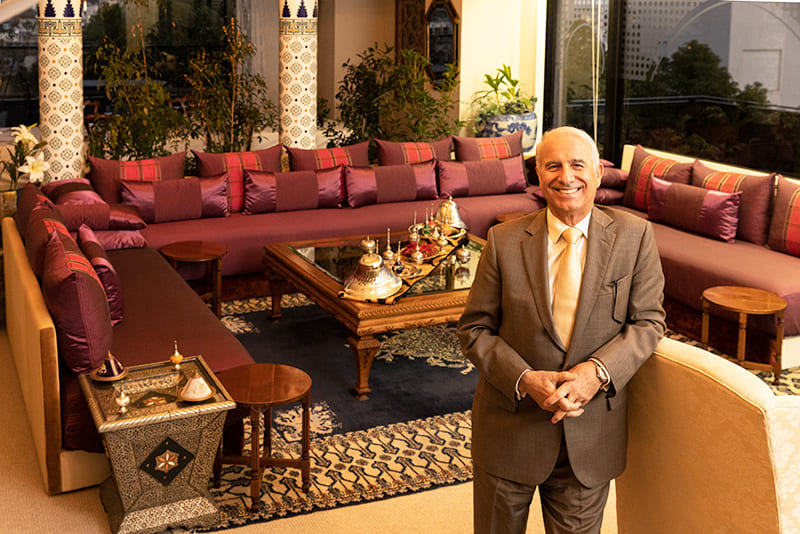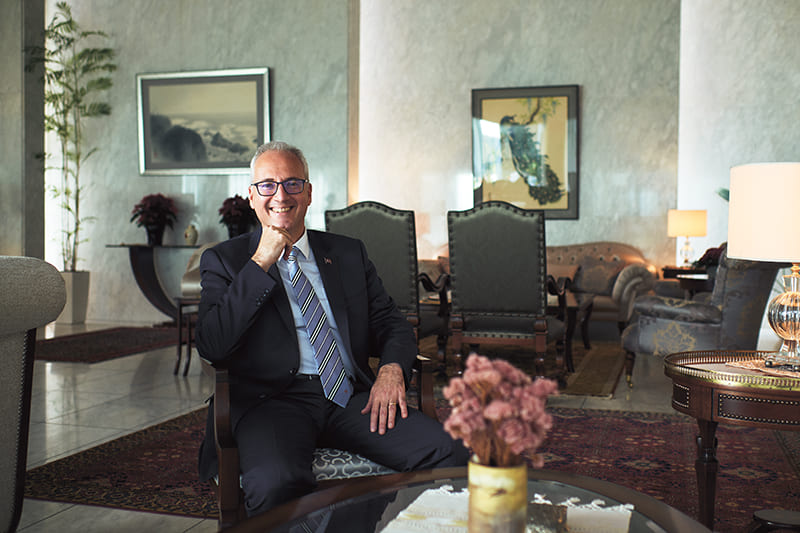December 22, 2023
Argentine envoy appreciates Japanese tradition
ARGENTINA
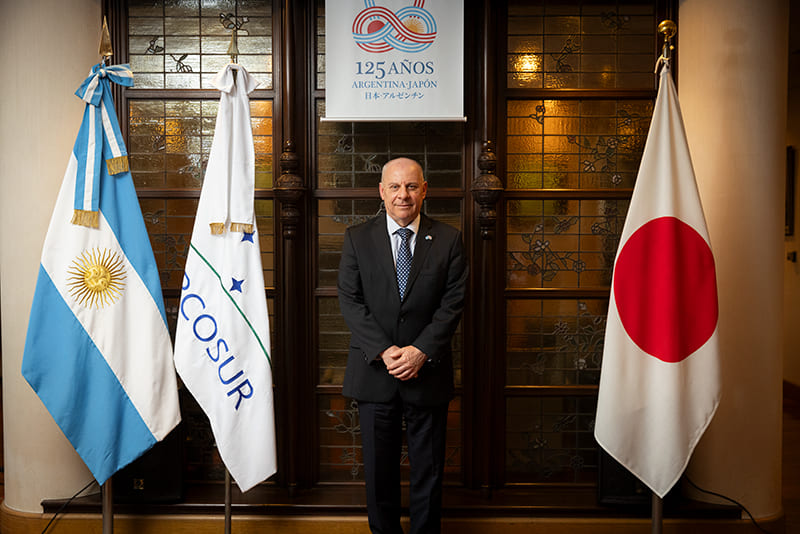
PHOTOS: YOSHIAKI TSUTSUI
Argentina, situated nearly on the opposite side of the world from Japan, celebrates the 125th anniversary of its enduring friendship with Japan this year. In this memorable year, Eduardo Tempone has been stationed as the ambassador of the Republic of Argentina to Japan. While he previously has been to Japan several times for business, this appointment marks his first extended stay in the country. Despite being new to living in Japan, Tempone brings with him a deep familiarity with Japanese culture. We engaged in a conversation with the ambassador about his favorite Japanese gifts, the evolving relationship between the two countries, and its prospects for the future.
The unique Japanese gifts selected by the ambassador, who boasts diplomatic experience and a profound understanding of diverse cultures, bring fresh insights into items that are typically familiar to the Japanese. He deeply appreciates kimonos and other items that echo Japanese traditions. However, his particular interest lies in the art of calligraphy, dedicated to the beautiful depiction of kanji characters. Tracing its origins to Buddhist monks who brought Chinese kanji culture to Japan, calligraphy in Japan evolved with a focus on aesthetic beauty, especially in the replication of characters. It manifested this Japanese sense of beauty in calligraphy by using fine lines, dots and nuanced shading variations. He noted that he often encounters framed calligraphic artworks in Japanese restaurants. “I frequently see two kanji characters written in calligraphy, and I really love it,” he said with enthusiasm.
Discovering sparkling Japanese sake was another unique experience. “I didn’t even know such a sparkling sake existed, but it tasted good. It tastes quite similar to champagne,” he remarked. He also expressed a keen interest in purchasing Japanese whisky as gifts for friends back home. Although Japanese whisky has a relatively short history, it has developed a unique character and gained global admiration. Japan’s mild climate and water, which is low in organic matter, are among the factors that contribute to the production of delicate and well-balanced Japanese whisky. “Today, Japanese whisky is a topic of interest worldwide, enjoying popularity in Argentina and other places like New York,” he explained, highlighting the international appeal of Japanese whisky.
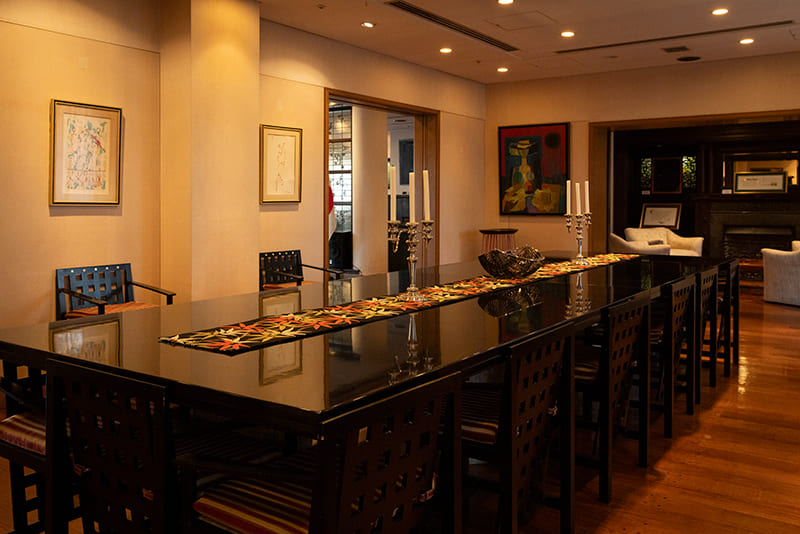
The ambassador expresses a hope to visit various regions of Japan during his stay, but his enthusiasm is particularly strong for Okinawa. This interest is rooted in the deep historical connection between Okinawa and Argentina, as evidenced by the estimated 65,000 people of Japanese descent in Argentina, of whom around 70% are of Okinawan origin. Predominantly consisting of third-generation and fourth-generation descendants, this community underscores the cultural and historical significance of Okinawa, making it much more than just a travel destination for the ambassador.
On a recent short weekend getaway, he visited Kyoto, taking in the sights of the Kyoto Imperial Palace, historical temples and traditional sites. One of the most striking experiences was during his stay in a ryokan in Kyoto. Upon entering the room, he was immediately reminded of the renowned Japanese film director Yasujiro Ozu (1903-63) and his classic movie “Tokyo Story.” The room evoked the distinctive style and atmosphere that Ozu masterfully captured in his films, he commented. He recalled how Ozu’s unique style involved keeping the camera at a low angle, creating a sense of being intimately connected with the world it portrayed. “In the ryokan, we sit and sleep on tatami mats in this low position. I felt as though I was immersed in those black-and-white films I watched on Argentine television back in the 1960s.” He was particularly fascinated by Ozu’s approach to cinematography, where the camera was positioned close to the ground, resembling a still image.
The ambassador’s deep understanding and interest in Japanese culture likely stem from the long-standing relationship between the two countries. “Since the signing of the Treaty of Friendship, Commerce and Navigation between Argentina and Japan in Washington, D.C., on Feb. 3, 1898, we have shared a wonderful relationship,” the ambassador noted. Over the years, this bond has grown stronger, encompassing a broad spectrum of areas including politics, economics and culture.
In the living room of the ambassador’s official residence stands a wooden table, uniquely crafted from the timber of the battleship Mikasa. Resting upon it is a model of the same vessel. These items symbolize and speak volumes about the deep historical connections between the two countries.
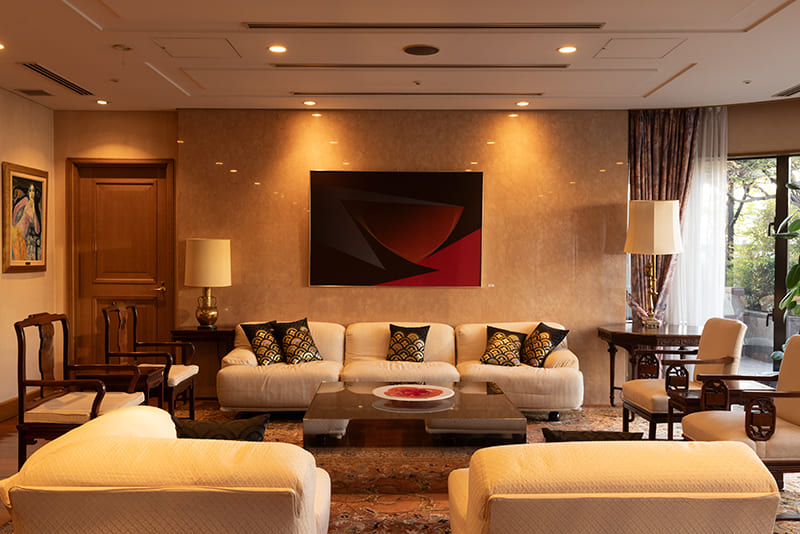

In the year leading up to the Russo-Japanese War, Argentina offered to sell Japan two advanced armored cruisers, originally ordered from Italy. Japan swiftly entered negotiations and successfully reached an agreement for their purchase. These two ships, arriving in Yokosuka on Feb. 16, 1904, just six days following the outbreak of the war, played a pivotal role in the conflict. Named Nisshin and Kasuga, they operated under the flagship Mikasa. Their significant contributions and war achievements during the Battle of the Sea of Japan marked a notable chapter in naval history.
On the economic front, Japanese corporations are significantly impacting Argentina, the ambassador said. He specifically mentioned major companies like Toyota, Nissan, Honda and Marubeni, highlighting their crucial role in job creation and economic stimulation within the country. “We are eager to further strengthen and deepen this relationship,” he said, underscoring the importance of ongoing economic collaboration between the two nations.
Cultural exchanges between the two countries are thriving, reflecting a dynamic and growing relationship that enriches both societies. There is a significant flow of people between the two countries, including artists, dancers, musicians and other cultural figures who travel from Argentina to perform in Japan.
This year, a series of events were held to commemorate the 125th anniversary of the friendship between the two nations. In a striking display of cultural fusion, Argentine artists designed a kimono that incorporated elements from Argentine culture. This creative blending also saw the merging of traditional Argentine ponchos with Japanese kimonos. There were collaborative performances where Argentine tango dancers shared the stage with Japanese tango dancers. Moreover, Argentine musicians showcased their talent by playing Japanese songs on the quena, a traditional Argentine instrument, further symbolizing the rich cultural exchange between the two countries.

Similarly, Japanese culture holds a significant influence in Argentina. “There are many aspects of Japanese culture that resonate in Argentina, like cinema and literature, but particularly manga and anime,” he noted. This influence has sparked a growing interest among Argentines in learning the Japanese language, further strengthening the cultural ties between the two nations.
The ambassador outlined key objectives for the future, emphasizing expanding trade and investment relations and collaborating with Japan in areas such as energy transition and food security. A primary focus is the complete opening of the Japanese market to Argentine beef. Historically, Argentina faced challenges exporting raw beef to Japan due to concerns over foot-and-mouth disease. However, in 2018, Japan lifted the import ban on beef from the Patagonia region. Argentine beef, known for being pasture-raised, stands out for its lean quality and rich, natural flavor, with minimal unnecessary fat.
In line with the country’s commitment to sustainability, “In recent years, we have invested in the energy sector, particularly in lithium,” the ambassador said. “We are also exploring the development of processes in hydrogen. Argentina possesses natural resources, yet there is a need for further investment and technology.”
The ambassador highlighted the importance of partnering with Japan, a country known for its technological expertise and innovation. Japan’s leadership in this area is seen as a significant asset to Argentina’s initiatives. The relationship between Japan and Argentina, bridging a great distance, is set to expand further and deepen across a range of sectors.

AMBASSADOR EDUARDO TEMPONE
Tempone studied law at the National University of Cordoba in Argentina, as well as international relations at the Catholic University of Cordoba. He received his master’s degree in international affairs at the American University in Washington. Joining the Argentine foreign service in 1986 as a career diplomat, he has held various diplomatic posts, including in the Republic of Paraguay, the Permanent Mission of Argentina to International Organizations in Geneva, and at the Embassy of the Argentine Republic in the U.S. From 2020, he served as Argentina’s alternate representative to the Group of 20 at the Argentine Embassy in the U.S. He has been stationed in Tokyo as the Argentine ambassador to Japan since 2023.
歴史が織りなす豊かな関係。
外交的な経験や異文化に対する深い理解を持つ各国の大使。大使の視点を通して見る日本の贈り物や文化には、日本人には見慣れているものにも、新しい発見がある。エドゥアルド・テンポーネ駐日アルゼンチン大使は額装された書道の作品をお気に入りの一つに選ばれた。書道は、細かい線や点、濃淡の微妙な変化を工夫しながら、美しさを引き立てていく。そんな書道の魅了に惹きつけられているそうだ。
日本から見てほぼ裏側に位置するアルゼンチン。その距離を越えた両国の友好関係は今年2023年に125周年という節目を迎え、政治、経済、文化など多岐にわたる分野で交流を深めてきた。日本からアルゼンチンへの移民の歴史もあり、アルゼンチンには日本人コミュニティーも存在する。今後は、日本との貿易や投資の拡大、エネルギー転換や食料安全保障面での提携などを目標として掲げていると話す大使。長年にわたって築かれてきた両国の友好関係は、今後もさまざまな分野でさらに発展していくだろう。
Return to Sustainable Japan Magazine Vol. 31 article list page

